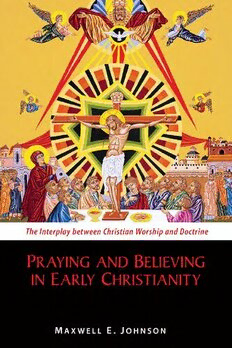
Praying and Believing in Early Christianity: The Interplay between Christian Worship and Doctrine PDF
Preview Praying and Believing in Early Christianity: The Interplay between Christian Worship and Doctrine
All content available from the Liturgical Press website is protected by copyright and is owned or controlled by Liturgical Press. You may print or download to a local hard disk the e-book content for your personal and non-commercial use only equal to the number of copies purchased. Each reproduction must include the title and full copyright notice as it appears in the content. UNAUTHORIZED COPYING, REPRODUCTION, REPUBLISHING, UPLOAD- ING, DOWNLOADING, DISTRIBUTION, POSTING, TRANSMITTING OR DUPLICATING ANY OF THE MATERIAL IS PROHIBITED. ISBN: 978-0-8146-8284-5 Maxwell E. Johnson Praying and Believing in Early Christianity The Interplay between Christian Worship and Doctrine A Michael Glazier Book LITURGICAL PRESS Collegeville, Minnesota www.litpress.org A Michael Glazier Book published by Liturgical Press Cover design by Jodi Hendrickson. Cover image: Eucharist—Sacrificial Banquet Icon by Monsignor Anthony A. La Femina, STL, JCD. Used by permission. Scripture texts in this work are taken from the New Revised Standard Version Bible © 1989, Division of Christian Education of the National Council of the Churches of Christ in the United States of America. Used by permission. All rights reserved. © 2013 by Order of Saint Benedict, Collegeville, Minnesota. All rights reserved. No part of this book may be reproduced in any form, by print, microfilm, micro- fiche, mechanical recording, photocopying, translation, or by any other means, known or yet unknown, for any purpose except brief quotations in reviews, without the previous written permission of Liturgical Press, Saint John’s Abbey, PO Box 7500, Collegeville, Minnesota 56321-7500. Printed in the United States of America. The Library of Congress has cataloged the printed edition as follows: Library of Congress Cataloging-in-Publication Data Johnson, Maxwell E., 1952– Praying and believing in early Christianity : the interplay between Christian worship and doctrine / Maxwell E. Johnson. pages cm “A Michael Glazier book.” Includes index. ISBN 978-0-8146-8259-3 (pbk. : alk. paper) — ISBN 978-0-8146-8284-5 (e-book) 1. Worship—History—Early church, ca. 30–600. 2. Church history— Primitive and early church, ca. 30–600. I. Title. BV6.J645 2013 270.1—dc23 2013007002 In Memoriam R. Kevin Seasoltz, OSB (+ 2013) Teacher, Colleague, and Friend Contents List of Abbreviations viii Introduction ix Chapter 1: Liturgical Praying and the Priority of Grace 1 Chapter 2: Doxology and Trinity 24 Chapter 3: Christ and Mary 68 Chapter 4: Worship and Praxis 95 Chapter 5: Conclusion: Praying and Believing Together 128 Index 144 vii Abbreviations ANF Ante-Nicene Fathers BCE Before the Common Era CE Common Era CSEL Corpus Scriptorum Ecclesiasticorum Latinorum GCS Die griechischen christlichen Schriftsteller LCC Library of Christian Classics LEW F. E. Brightman, Liturgies Eastern and Western, vol. 1: Eastern Liturgies. Oxford: Clarendon Press, 1896. NPNF Nicene and Post-Nicene Fathers PEER Prayers of the Eucharist: Early and Reformed, edited by R. C. D. Jasper and G. J. Cumming. 3rd rev. ed. Collegeville, MN: Liturgical Press, 1987. PG Patrologia Graeca PL Patrologia Latina SC Sources chrétiennes viii Introduction I remember hearing part of a conversation between two of my semi- nary professors—one, a professor of New Testament at the Lutheran seminary where I was enrolled, and the other, a professor of liturgy at the neighboring Roman Catholic seminary, where in the spring semester of 1975 I was taking my first serious course in liturgical history—over the proper place of liturgy in the seminary curriculum. For the Lutheran professor, the place of liturgy was to be included naturally in the “Practical Area” of seminary education along with parish administration, homiletics, parish education, and pastoral care and counseling, since, in his opinion, the study of liturgy had more to do with the practicalities of presiding at worship than with theology and/or history. For the Roman Catholic faculty member, however, liturgy naturally was to be included in the “History and Theology Area” of the curriculum both because liturgy constituted an aca- demic discipline in its own right and because he saw liturgy having a historic and foundational relationship to theology and doctrine in general. To my knowledge, this discussion never reached a resolu- tion with courses in liturgy at the Lutheran seminary remaining in the “Practical Area” and those at the Roman Catholic seminary in the “History and Theology Area,” although courses in presiding at the rites themselves were taught there within the practical area as well. This discussion has implications for the question of liturgical the- ology today along the lines of the classic relationship between liturgy and doctrine, often summarized by the abbreviated Latin phrase of Prosper of Aquitaine (c. 390–c. 455): “Lex orandi, lex credendi,” i.e., the “law of praying (is, constitutes, or establishes) the law of believ- ing.” For the Lutheran faculty member referred to above, although these words would not have been used, the lex credendi (especially Lutheran confessional and sacramental theology) was to be learned independently of the church’s liturgy and then, perhaps, applied to what one did in liturgy. Hence, to put words in this professor’s mouth, the relationship was that the lex credendi always established the lex orandi and, of course, the lex credendi was always, therefore, primary. ix
